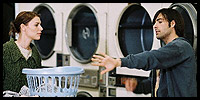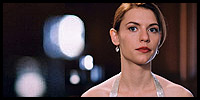
 |
|
Shopgirl (2005) Cast: Claire Danes, Steve Martin, Jason Schwartzman, Bridgette Wilson-Sampras, Sam Bottoms, Frances Conroy, Rebecca Pidgeon, Samantha Shelton, Gina Doctor, Clyde Kusatsu, Romey Rosemont, Joshua Snyder, Rachel Nichols 2005 – 104 minutes Rated: Reviewed by Dustin Putman, November 5, 2005.  Watching "Shopgirl," the film adaptation of Steve Martin's 2001 novella, one wonders what this largely comedic actor's inspiration was in writing about a lonely young woman who works behind the glove counter at L.A.'s Saks Fifth Avenue. The source material and the source himself do not seem to correlate, with a male Hollywood actor penning a work that would seem to have more naturally come from a female writer. Either way, it is difficult to imagine anyone reading the book or seeing the cinematic representation of it and not walking away with a newfound respect for Steve Martin. Even if the finished effort is sporadically uneven, it is the sharp details and refreshing level of maturity with which the story is told that genuinely surprises. This is not some happy-go-lucky, lovey-dovey, saccharine romance with music montages every three minutes. To be fair, there are a couple of montages, but what they hold and what surrounds them is a great deal tougher and more uncompromising than the typical mainstream rom-com.
Watching "Shopgirl," the film adaptation of Steve Martin's 2001 novella, one wonders what this largely comedic actor's inspiration was in writing about a lonely young woman who works behind the glove counter at L.A.'s Saks Fifth Avenue. The source material and the source himself do not seem to correlate, with a male Hollywood actor penning a work that would seem to have more naturally come from a female writer. Either way, it is difficult to imagine anyone reading the book or seeing the cinematic representation of it and not walking away with a newfound respect for Steve Martin. Even if the finished effort is sporadically uneven, it is the sharp details and refreshing level of maturity with which the story is told that genuinely surprises. This is not some happy-go-lucky, lovey-dovey, saccharine romance with music montages every three minutes. To be fair, there are a couple of montages, but what they hold and what surrounds them is a great deal tougher and more uncompromising than the typical mainstream rom-com.
 Hailing from a small town in Vermont, Mirabelle Buttersfield (Claire Danes) has recently moved to Los Angeles for a life of widened opportunities, but hasn't met many of them yet. Often daydreaming behind the glove counter at Saks (where she works), Mirabelle is an aspiring artist on the side, but her low turnaround rate on projects has left her with not much to sell. Soon after going out with goofy bohemian "font designer" Jeremy (Jason Schwartzman) and, in a moment of desperation/frustration/surrender, sleeping with him, Mirabelle is thrown a curve ball when she is invited on a date by wealthy computer executive Ray Porter (Steve Martin). Mirabelle doesn't know much about Ray, and he is at least thirty years older than she, but he treats her right and is even unblinkingly honest when he tells her after their first night together that he isn't looking for something "permanent." Mirabelle initially says she is fine with an open relationship, but as the two bond and grow closer over time, what they mean to each other becomes less clear.
Hailing from a small town in Vermont, Mirabelle Buttersfield (Claire Danes) has recently moved to Los Angeles for a life of widened opportunities, but hasn't met many of them yet. Often daydreaming behind the glove counter at Saks (where she works), Mirabelle is an aspiring artist on the side, but her low turnaround rate on projects has left her with not much to sell. Soon after going out with goofy bohemian "font designer" Jeremy (Jason Schwartzman) and, in a moment of desperation/frustration/surrender, sleeping with him, Mirabelle is thrown a curve ball when she is invited on a date by wealthy computer executive Ray Porter (Steve Martin). Mirabelle doesn't know much about Ray, and he is at least thirty years older than she, but he treats her right and is even unblinkingly honest when he tells her after their first night together that he isn't looking for something "permanent." Mirabelle initially says she is fine with an open relationship, but as the two bond and grow closer over time, what they mean to each other becomes less clear.
 Working as both a poignant love story and a astute multi-character study about three separate people's quest for self-fulfillment, "Shopgirl" is consistently smart, treating its protagonists with an open-minded humanity often destroyed by lesser screenplays that dumb them down. In Martin's script, there are no simple misunderstandings between lovers that could be solved in five seconds if one of them opened their mouth and explained the situation. Instead, the three central figures—Mirabelle, Ray, and Jeremy—are up front and truthful about their beliefs and feelings. When Mirabelle ultimately gets hurt, it is because she refused to accept what Ray had long since warned her about, not because he wasn't forthright with her. Likewise, there are no last-minute dashes to the airport or soul-bearing confessions in the middle of a church's wedding procession. What develops between this trio is more natural and juggled with a subtler hand, matching their flawed, but sincere, personality traits.
Working as both a poignant love story and a astute multi-character study about three separate people's quest for self-fulfillment, "Shopgirl" is consistently smart, treating its protagonists with an open-minded humanity often destroyed by lesser screenplays that dumb them down. In Martin's script, there are no simple misunderstandings between lovers that could be solved in five seconds if one of them opened their mouth and explained the situation. Instead, the three central figures—Mirabelle, Ray, and Jeremy—are up front and truthful about their beliefs and feelings. When Mirabelle ultimately gets hurt, it is because she refused to accept what Ray had long since warned her about, not because he wasn't forthright with her. Likewise, there are no last-minute dashes to the airport or soul-bearing confessions in the middle of a church's wedding procession. What develops between this trio is more natural and juggled with a subtler hand, matching their flawed, but sincere, personality traits.
 Following a few years of toiling through supporting roles, Claire Danes (2002's "The Hours") makes a welcome return to the spotlight. In portraying the lost, internal Mirabelle, whose life has not gone as she planned, Danes builds a complicated, three-dimensional character. First and foremost, Mirabelle longs for happiness, and when her hopes are consistently dashed by Ray's non-committal ways, Danes' reaction is heartbreaking. Pit-stops along the way of Mirabelle's journey are less solidly conceived, with a trip to see her parents (Timothy Bottoms, Frances Conroy) too brief to make the impact and point it wants to, and a chat with two girlfriends awkward because they are never seen or heard from before or after this scene. Thankfully, when troubles arise after Mirabelle opts to stop taking her anti-depressant medication, it is dealt with in a quiet, realistic manner and does not become a major "disease of the week"-style plot development.
Following a few years of toiling through supporting roles, Claire Danes (2002's "The Hours") makes a welcome return to the spotlight. In portraying the lost, internal Mirabelle, whose life has not gone as she planned, Danes builds a complicated, three-dimensional character. First and foremost, Mirabelle longs for happiness, and when her hopes are consistently dashed by Ray's non-committal ways, Danes' reaction is heartbreaking. Pit-stops along the way of Mirabelle's journey are less solidly conceived, with a trip to see her parents (Timothy Bottoms, Frances Conroy) too brief to make the impact and point it wants to, and a chat with two girlfriends awkward because they are never seen or heard from before or after this scene. Thankfully, when troubles arise after Mirabelle opts to stop taking her anti-depressant medication, it is dealt with in a quiet, realistic manner and does not become a major "disease of the week"-style plot development.
 As the men in Mirabelle's life, Steve Martin (2003's "Bringing Down the House") plays the part of Ray Porter with the sort of low-key power of a present-day Bill Murray, suggesting a dramatic range long left untapped in the movies. Ray is neither a good guy nor a bad guy—no one, in fact, becomes a stock villain—but a so-called "unsettled" middle-aged man who is uncomfortable in sharing a serious, monogamous relationship. He does care for Mirabelle, choosing to buy her things and pay off her hefty college loans because he can, but is less willing to open up his heart to her. As the severely quirky Jeremy, who manages to charm Mirabelle for the opposite reasons Ray does, Jason Schwartzman (2004's "I ♥ Huckabees") defies the odds of his potentially annoying character and makes him into arguably the most heartfelt of the three. At first, he is all wrong in the way he handles his and Mirabelle's first date, making her pay his way to see an IMAX movie and too cheap to go to dinner. When their contact is cut off, though, and he finds himself traveling on the road with a rock singer and having a lot of free time to concentrate on himself, he makes a startling self-discovery that transforms him into a better man. Schwartzman is equal parts uproarious and sweetly lovable in a secondary role that gains importance in the third act.
As the men in Mirabelle's life, Steve Martin (2003's "Bringing Down the House") plays the part of Ray Porter with the sort of low-key power of a present-day Bill Murray, suggesting a dramatic range long left untapped in the movies. Ray is neither a good guy nor a bad guy—no one, in fact, becomes a stock villain—but a so-called "unsettled" middle-aged man who is uncomfortable in sharing a serious, monogamous relationship. He does care for Mirabelle, choosing to buy her things and pay off her hefty college loans because he can, but is less willing to open up his heart to her. As the severely quirky Jeremy, who manages to charm Mirabelle for the opposite reasons Ray does, Jason Schwartzman (2004's "I ♥ Huckabees") defies the odds of his potentially annoying character and makes him into arguably the most heartfelt of the three. At first, he is all wrong in the way he handles his and Mirabelle's first date, making her pay his way to see an IMAX movie and too cheap to go to dinner. When their contact is cut off, though, and he finds himself traveling on the road with a rock singer and having a lot of free time to concentrate on himself, he makes a startling self-discovery that transforms him into a better man. Schwartzman is equal parts uproarious and sweetly lovable in a secondary role that gains importance in the third act.
 As this dysfunctional quasi-love triangle works itself out in organic ways, "Shopgirl" hits some rough patches that director Anand Tucker (1998's "Hilary and Jackie") luckily manages to recover from. A detour involving a gold-digging coworker at Saks (Bridgette Wilson-Sampras) who mistakes Jeremy for Ray is good for some real laughs, but doesn't serve a purpose or lead anywhere special. Although the main character, Mirabelle could have benefitted from being wholly concentrated on; as is, the film leaves her too often to follow the other characters. This is especially true of the very last scene, effective in its own right but misguidedly told from the point-of-view of a different character when she had earned the final say. Finally, although unintentional, the movie sometimes recalls 2003's masterpiece, "Lost in Translation," in its look at a May-December relationship between two lost souls, but pales in comparison. There simply isn't as much of a connection between Mirabelle and Ray or as many insights into human nature as that stunner of a picture.
As this dysfunctional quasi-love triangle works itself out in organic ways, "Shopgirl" hits some rough patches that director Anand Tucker (1998's "Hilary and Jackie") luckily manages to recover from. A detour involving a gold-digging coworker at Saks (Bridgette Wilson-Sampras) who mistakes Jeremy for Ray is good for some real laughs, but doesn't serve a purpose or lead anywhere special. Although the main character, Mirabelle could have benefitted from being wholly concentrated on; as is, the film leaves her too often to follow the other characters. This is especially true of the very last scene, effective in its own right but misguidedly told from the point-of-view of a different character when she had earned the final say. Finally, although unintentional, the movie sometimes recalls 2003's masterpiece, "Lost in Translation," in its look at a May-December relationship between two lost souls, but pales in comparison. There simply isn't as much of a connection between Mirabelle and Ray or as many insights into human nature as that stunner of a picture.
 Despite these things, there are a lot to elements to admire and recommend, none more that the unpredictable, if fitting, trajectories of its characters. For once, "Shopgirl" is not a romance that hinges on who ends up with who, but how they learn and grow from the experiences they have, and somehow end up a wiser person on the other side. For this reason, the film proves to have a little extra to offer the viewer before and after the end credits have rolled than any number of homogenized, cookie-cutter love stories released each year.
Despite these things, there are a lot to elements to admire and recommend, none more that the unpredictable, if fitting, trajectories of its characters. For once, "Shopgirl" is not a romance that hinges on who ends up with who, but how they learn and grow from the experiences they have, and somehow end up a wiser person on the other side. For this reason, the film proves to have a little extra to offer the viewer before and after the end credits have rolled than any number of homogenized, cookie-cutter love stories released each year.
|
© 2008 by Dustin Putman |














